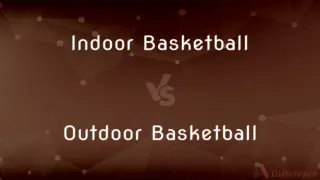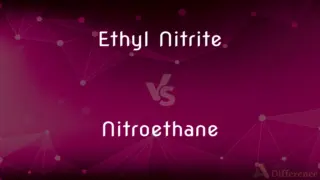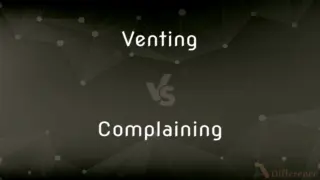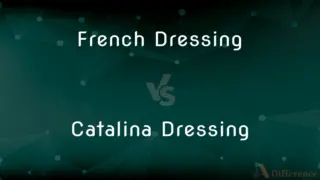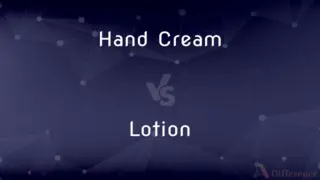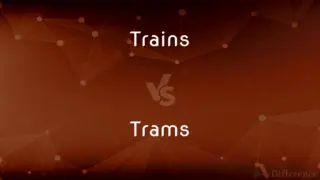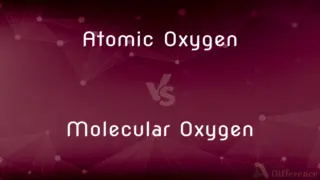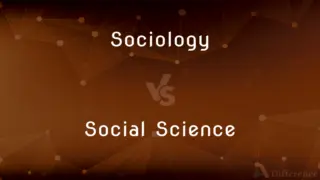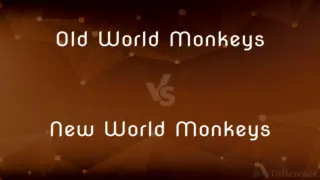Enough vs. Sufficient — What's the Difference?
By Tayyaba Rehman & Maham Liaqat — Updated on March 12, 2024
Enough emphasizes the adequacy to meet a need, while sufficient leans more towards meeting a standard or requirement.

Difference Between Enough and Sufficient
Table of Contents
ADVERTISEMENT
Key Differences
Enough is commonly used to signify a quantity or degree that meets the needs or desires at hand. For instance, saying "I have enough food" conveys a sense of satisfaction or fulfillment regarding the amount of food available. Sufficient, on the other hand, often carries a more objective or minimalistic tone, implying just enough to meet specific criteria or standards. When someone says "The evidence is sufficient for a conviction," it suggests that the evidence meets the necessary legal threshold, without implying excess.
Enough often carries a more personal or subjective connotation, indicating a satisfaction with what is available. It's about meeting or surpassing personal needs or desires, as in "I've had enough rest to feel refreshed."
Sufficient, however, leans towards an impersonal or utilitarian aspect, focusing on meeting defined requirements or standards rather than personal satisfaction. For example, "This space is sufficient for the event" implies that the space meets the event's logistical requirements.
The context in which each term is used can significantly affect their implications. Enough can suggest a level of personal contentment or fulfillment, whereas sufficient might imply mere adequacy without excess.
Comparison Chart
Connotation
Personal satisfaction or fulfillment
Meeting a standard or requirement
ADVERTISEMENT
Usage Context
Subjective, personal situations
Objective, formal criteria
Implication
Can imply surplus or just right
Often implies bare minimum
Emotional Tone
Often positive or content
Neutral or utilitarian
Examples
"Enough time to enjoy the holiday"
"Sufficient data to conclude"
Compare with Definitions
Enough
Adequate for the need or desire.
I have enough money to buy the dress.
Sufficient
Adequate for a particular purpose.
His apology was sufficient to mend their friendship.
Enough
As much as required.
We've seen enough evidence.
Sufficient
Enough to achieve a goal.
We have sufficient funds for the project.
Enough
Satisfying a certain quantity.
There's enough cake for everyone.
Sufficient
Meeting the requirements.
The evidence was sufficient for a conviction.
Enough
Signifying the end of a desire or need.
I've had enough of this noise.
Sufficient
Just enough without excess.
The space is sufficient for our needs.
Enough
A statement of sufficiency.
That's enough work for today.
Sufficient
Meeting the minimal standards.
The repair was sufficient to pass inspection.
Enough
As much or as many as required
Getting enough of the right things to eat
There will be time enough to tell you when we meet
Too much work and not enough people to do it
There was just enough room for two cars
Sufficient
Being as much as is needed; adequate; enough.
Enough
As much or as many as required
Too much work and not enough people to do it
There was just enough room for two cars
Getting enough of the right things to eat
There will be time enough to tell you when we meet
Sufficient
(Archaic) Competent; qualified.
Enough
To the required degree or extent (used after an adjective, adverb, or verb)
You're not big enough for basketball
Before he was old enough to shave
Sufficient
An adequate quantity of; enough.
We have sufficient supplies to last the winter.
There is not sufficient access to the Internet in many small rural villages.
Enough
Sufficient to meet a need or satisfy a desire; adequate
Enough work to keep us all busy.
Sufficient
(as pronoun) A quantity (of something) that is as large as is needed.
We don't need any more; we already have sufficient.
Sufficient of us are against this idea that we should stop now.
Enough
To a satisfactory amount or degree; sufficiently
Is the fish cooked enough?.
Sufficient
Of a type or kind that suffices, that satisfies requirements or needs.
This is a necessary condition but not a sufficient one.
Enough
Very; fully; quite
We were glad enough to leave.
Sufficient
Possessing adequate talents or accomplishments; of competent power or ability; qualified; fit.
Enough
Tolerably; rather
She sang well enough, but the show was a failure.
Sufficient
(archaic) Capable of meeting obligations; responsible.
Enough
Used to express impatience or exasperation
You've been practicing the guitar all afternoon. Enough!.
Sufficient
(obsolete) Having enough money to meet obligations and live comfortably.
Enough
Sufficient; all that is required, needed, or appropriate.
I've already had enough coffee today.
There is food enough for us all (old-fashioned) .
Sufficient
Equal to the end proposed; adequate to wants; enough; ample; competent; as, provision sufficient for the family; an army sufficient to defend the country.
My grace is sufficient for thee.
Enough
Sufficiently.
I cannot run fast enough to catch up to them.
Are you man enough to fight me?
You've worked enough; rest for a bit.
Sufficient
Possessing adequate talents or accomplishments; of competent power or ability; qualified; fit.
Who is sufficient for these things?
Enough
Fully; quite; used after adjectives to express slight augmentation of the positive degree, and sometimes equivalent to very.
He is ready enough to accept the offer.
Sufficient
Capable of meeting obligations; responsible.
The man is, notwithstanding, sufficient . . . I think I may take his bond.
Enough
Used after certain adverbs to emphasise that a quality is notable, unexpected, etc.
Talking of Mr Smith, funnily enough, I saw him just the other day.
I left my camera on the train, but luckily enough someone handed it in to lost property.
Sufficient
Self-sufficient; self-satisfied; content.
Thou art the most sufficient (I'll say for thee),Not to believe a thing.
Enough
A sufficient or adequate number, amount, etc.
I have enough (of it) to keep me going.
Enough of you are here to begin the class.
Get some more plates. There aren’t enough yet.
Not enough is known yet about the causes of the pandemic.
There wasn't enough of an economic surplus.
Sufficient
Of a quantity that can fulfill a need or requirement but without being abundant;
Sufficient food
Enough
Stop! Don't do that any more!
I'm sick of you complaining! Enough!
Enough
An instance of being sufficient, or of doing something sufficiently.
Enough
Satisfying desire; giving content; adequate to meet the want; sufficient; - usually, and more elegantly, following the noun to which it belongs.
How many hired servants of my father's have bread enough and to spare!
Enough
In a degree or quantity that satisfies; to satisfaction; sufficiently.
Enough
Fully; quite; - used to express slight augmentation of the positive degree, and sometimes equivalent to very; as, he is ready enough to embrace the offer.
I know you well enough; you are Signior Antonio.
Thou knowest well enough . . . that this is no time to lend money.
Enough
In a tolerable degree; - used to express mere acceptableness or acquiescence, and implying a degree or quantity rather less than is desired; as, the song was well enough.
Enough
A sufficiency; a quantity which satisfies desire, is adequate to the want, or is equal to the power or ability; as, he had enough to do take care of himself.
And Esau said, I have enough, my brother.
Enough
An exclamation denoting sufficiency, being a shortened form of it is enough.
Enough
An adequate quantity; a quantity that is large enough to achieve a purpose;
Enough is as good as a feast
There is more than a sufficiency of lawyers in this country
Enough
Enough to meet a purpose;
An adequate income
The food was adequate
A decent wage
Enough food
Food enough
Enough
As much as necessary;
Have I eaten enough?
I've had plenty, thanks
Common Curiosities
Is "enough" more subjective than "sufficient"?
Yes, "enough" often carries a more personal or subjective connotation.
What does "enough" imply?
Enough implies a quantity that meets or exceeds a need or desire.
How is "sufficient" commonly used?
Sufficient is used to describe something that meets the necessary standards or requirements, often with a minimalistic tone.
Can "enough" and "sufficient" be used interchangeably?
They can sometimes be used interchangeably, but the choice of word can affect the nuance of the statement.
Can "enough" indicate surplus?
Yes, "enough" can suggest that there is more than what is merely required.
Can "enough" be used in a negative sense?
Yes, "enough" can be used to express frustration or fed-up sentiments, as in "I've had enough!"
How does "enough" relate to personal satisfaction?
"Enough" relates to a level of personal satisfaction or fulfillment with what has been achieved or obtained.
Does "sufficient" imply a bare minimum?
Sufficient can imply just enough to meet a specific standard, often without excess.
How do context and tone affect the use of "enough" and "sufficient"?
The choice between "enough" and "sufficient" can depend on the context and desired tone, with "enough" often being more personal and "sufficient" more objective.
Does "sufficient" always mean adequate without any excess?
While "sufficient" typically means meeting the bare minimum, context can sometimes broaden its meaning to include a slight excess.
Is "sufficient" more formal than "enough"?
Sufficient can be perceived as more formal or objective, especially in technical or legal contexts.
Is "sufficient" used in legal or technical language?
Yes, "sufficient" is often used in legal, technical, or formal language to denote adequacy according to specific criteria.
In what situations is "enough" more appropriate than "sufficient"?
"Enough" is more appropriate in personal, subjective contexts where satisfaction or fulfillment is being expressed.
When should "sufficient" be chosen over "enough"?
"Sufficient" should be chosen in contexts that require an objective assessment of whether certain criteria or standards have been met.
How does the emotional tone differ between "enough" and "sufficient"?
"Enough" often has a positive or content emotional tone, whereas "sufficient" tends to be more neutral or utilitarian.
Share Your Discovery
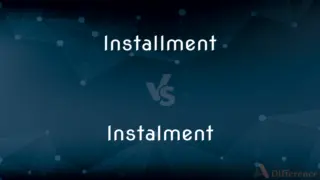
Previous Comparison
Installment vs. Instalment
Next Comparison
Instill vs. InstallAuthor Spotlight
Written by
Tayyaba RehmanTayyaba Rehman is a distinguished writer, currently serving as a primary contributor to askdifference.com. As a researcher in semantics and etymology, Tayyaba's passion for the complexity of languages and their distinctions has found a perfect home on the platform. Tayyaba delves into the intricacies of language, distinguishing between commonly confused words and phrases, thereby providing clarity for readers worldwide.
Co-written by
Maham Liaqat














